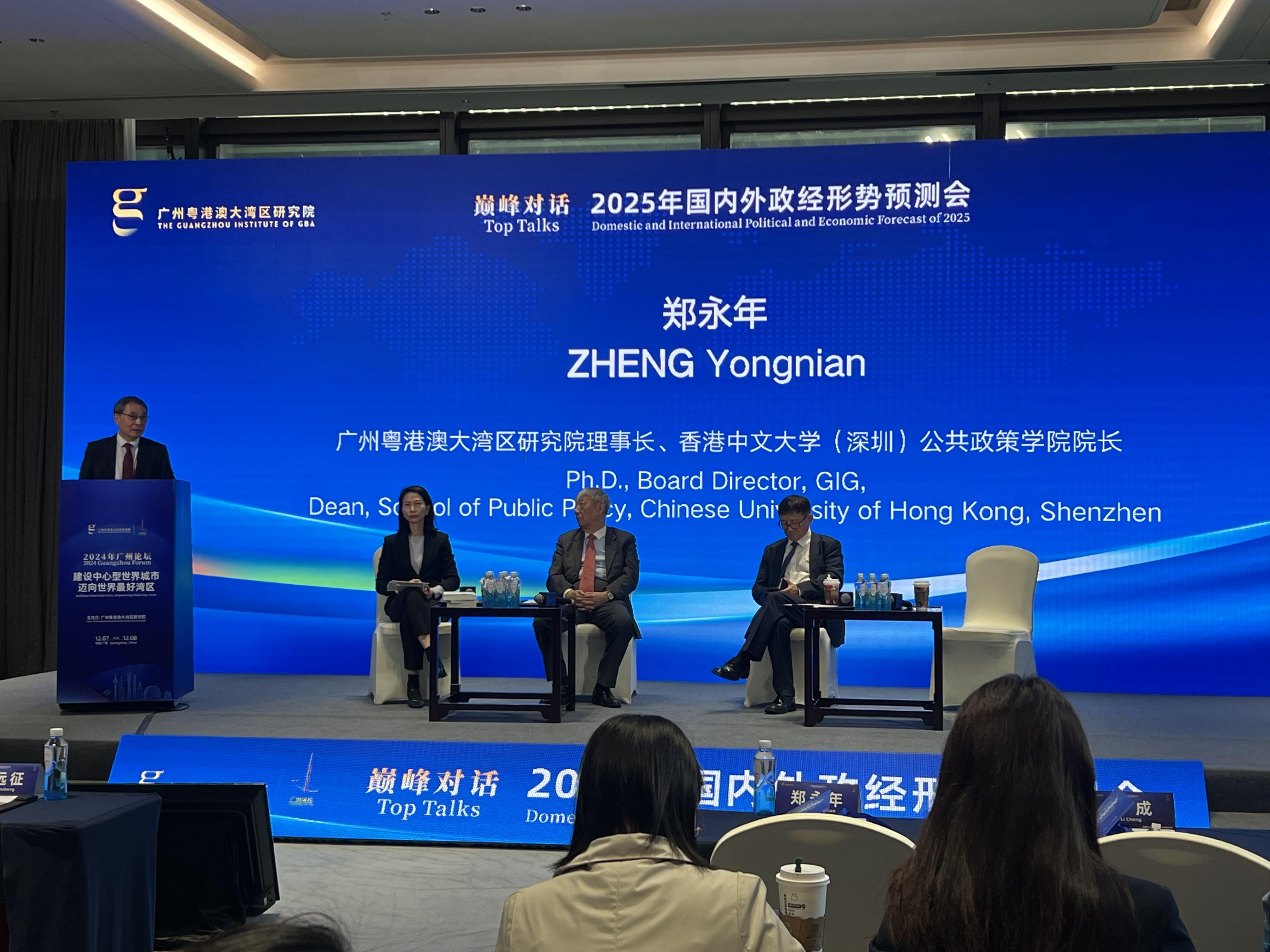
On December 7th, the 2024 Guangzhou Forum and the 2025 Global and Domestic Political and Economic Situation Forecast Conference were held in Guangzhou, hosted by the Guangzhou Institute of GBA (GIG). Prominent scholars and experts, including Cao Yuanzheng, Vice President of the China Society for Macroeconomics and former Chief Economist of the Bank of China, Li Cheng, Founding Director of the Center for Contemporary China and the World (CCCW) at the University of Hong Kong and Academic Committee Member of the GIG, and Zheng Yongnian, Board Director of the GIG and Dean of the School of Public Policy at The Chinese University of Hong Kong (Shenzhen), attended to analyze and judge the situation.
Cao Yuanzheng shared his views on the current global and Chinese economic situation. He mentioned two "unexpected" trends: first, the stubborn global inflation is difficult to control; second, the economic downturn pressure on developing countries is greater than expected. The downward pressure on China's economy comes from structural shifts, But there is no need to be overly anxious about China's economic trend. This is because projects like the China-Kyrgyzstan-Uzbekistan Railway within the "Belt and Road" initiative have revitalized the Eurasian continent, making China's economic development more balanced and resilient. The world economy is becoming more fragmented, But this does not mean deglobalization; it is globalization taking on a new form, reorganizing itself through regionalization. In this decisive period of regionalization reshaping the world, the key lies in direction and confidence.
Li Cheng first shared his paradoxical observations on Trump's potential second term-whether he could be the greatest or the worst president in American history, Bringing both fear and hope to American society and exacerbating the paradox of the American economy being both strong and fragile. He believes that Trump does not unite the United States or improve the world but rather creates more hatred and contradictions. Subsequently, he stated that there is both competition and cooperation between China and the United States, and Trump needs China's help, especially on international issues.
In today's complex and changing world order, Zheng Yongnian stated that it is not only a must to "understand China" but also to "understand the United States." Facing China-American relations, one should believe that "there are always more solutions than problems."
Zheng proposed three things that "should not be underestimated"-"do not underestimate Trump's destructive impact on the global trade system, do not underestimate the ability of global capital to recreate globalization, and do not underestimate China's ability to reshape the global trade system through its unilateral opening-up policy." China must be optimistic, and has reasons to be. However, China must also recognize the problems it faces. First, infrastructure construction must match economic activities; overbuilding is a waste of resources. Second, expanding incremental economy is key to escaping "involution," and the future growth of incremental economy relies on technological innovation. If technology regulation is too stringent, it could prevent many important technologies that could lead China into a new chapter of artificial intelligence from being implemented.

Source: Lingnan On the Cloud
2025年经济形势前瞻:中国必须乐观,也有理由乐观
12月7日,由广州粤港澳大湾区研究院主办的广州论坛2024年年会暨2025年国内外政经形势预测会在广州举办。中国宏观经济学会副会长、中国银行原首席经济学家曹远征,香港大学当代中国与世界研究中心创始主任、广州粤港澳大湾区研究院学术委员会委员李成,以及广州粤港澳大湾区研究院理事长、香港中文大学(深圳)公共政策学院院长郑永年等知名专家学者与会作分析研判。
曹远征分享了他对于当前世界及中国经济形势的看法,他认为出现了两个“没想到”——一是全球通货膨胀顽固,难以控制;二是发展中国家经济下行压力大到超出预期。中国经济下行压力来自结构性转变,但对于中国的经济走势不必过于焦虑,因为包括中吉乌铁路在内的“一带一路”建设项目盘活了欧亚大陆,也将使中国经济发展更加平衡、更具韧性。世界经济愈发碎片化,但这并不意味着去全球化,是全球化换了面貌,用区域化重新组织全球化。在区域化重塑全球的决定性时期,关键在于方向与信心。
李成首先分享了对于特朗普二次当选的悖论观察——其可能是美国历史上最伟大或最糟糕的总统,同时带给了美国社会恐惧和希望,加剧美国经济既强劲又脆弱的悖论。他认为特朗普不是把美国团结起来,把世界搞好,而是更多制造仇恨、制造矛盾。随后,他表示,中美既有竞争又有合作,特朗普需要中国的帮助,尤其是在国际问题上。
当今世界格局复杂多变,郑永年表示中国不光要“读懂中国”,更要“读懂美国”。面对中美关系,要相信“方法总比问题多”。
郑永年提出了三个“不要低估”——“不要低估特朗普对世界贸易体系的破坏程度,不要低估全球资本再造全球化的能力,更不要低估中国单边开放政策重塑世界贸易体系的能力”,中国必须乐观,也有理由乐观。然而,中国同时要意识到发展面临的问题。首先,基础设施建设要与经济活动相匹配,过度建设是资源浪费;其次,拓展增量经济是走出“内卷”的重点,而增量经济的未来增长要靠科技创新,如果对技术监管过度,极易导致许多能让中国迈向人工智能新篇章的重要技术无法落地。
文、图|记者 董柳
翻译|赵凡
审校|林佳岱
-
Huangmaohai Cross-Sea Channel to open: Jiangmen further integrates into GBA
2024-12-09 20:51:42 -
Cantonese opera culture in Guangzhou's communities becomes more popular
2024-12-09 20:51:54 -
Exclusive | Inscription of Spring Festival: a shared heritage for all
2024-12-08 22:38:18 -
Exclusive | Ambassador Bekele: Guangzhou Marathon is a world-class event
2024-12-08 22:38:43






